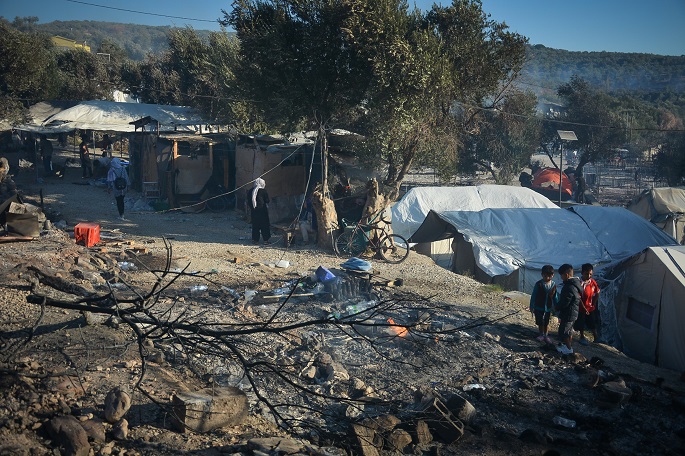Greek gov't rushes to shelter thousands after refugee camp gutted
Published : 10 Sep 2020, 01:01
The northeastern Aegean island of Lesvos was declared on Wednesday a state of emergency for four days as the Greek government rushed to provide shelter to thousands of people, after Moria, the country's largest refugee, migrant camp, was heavily damaged in a big fire, reported Xinhua.
"It seems that the blaze broke out on several fronts (late Tuesday and early Wednesday) as a result of the dismay of a few residents at Moria's reception center over the necessary quarantine imposed, since 35 cases of COVID-19 were traced after 1,900 tests were carried out in recent days," Alternate Minister of Migration and Asylum George Koumoutsakos told a press briefing in Athens.
The first confirmed infection of the novel coronavirus at Moria was diagnosed a week ago.
The fire swept throughout the overflowing camp which, according to government data, accommodated some 13,000 persons, well above its capacity for 2,757, sending panic-stricken people out on the streets or to the nearby mountains in the middle of the night, local officials said.
No injuries were reported, but Wednesday morning found Greek officials in a frenzy of meetings and telephone contacts with European partners to address a major humanitarian crisis, as Koumoutsakos stressed.
"I am deeply saddened by yesterday's events in Moria. I fully understand the difficult conditions at the camp there. However, there can be no alibi for the violent reactions to strict health protocols and checks due to COVID-19. Especially, when we are talking about reactions to the extent we witnessed last night. What happened there cannot go on any longer, as it is also a matter of public health, humanitarian, and national security," Greek Prime Minister Kyriakos Mitsotakis said in a televised message broadcast on Greek national broadcaster ERT after an extraordinary cabinet meeting.
"All national resources have been mobilized. Everybody on-site will be accommodated in appropriate living conditions. Those who have tested positive for COVID-19 will receive full medical attention," he said, adding that all unaccompanied minors (408, according to the ministry data) are already being relocated to hotels on the mainland.
A Greek shipping company has also offered a vessel for the accommodation of refugees and migrants as of Wednesday evening, while two Greek Navy ships will sail to the island on Thursday to temporarily shelter more people, other ministers told another press conference on Lesvos.
Approximately 3,500 refugees and migrants were left homeless due to the damages to part of the camp, said Migration and Asylum Minister Notis Mitarachi.
"As soon as the damages are fully assessed, and in full coordination with the European Commission, we will undertake concrete initiatives. Our priority remains the health and safety of the island's residents, as well as all the migrants and refugees," the prime minister stressed, noting that Margaritis Schinas, vice president of the European Commission, will be on the island on Thursday and in Athens for talks on Friday.
"The European Commission has offered full support and has declared its readiness to provide any aid our country needs. We are doing anything possible to address this very difficult situation," Koumoutsakos said.
Greek officials repeated on Wednesday Greece's message in the past five years that the refugee, migrant flows (mainly from Turkey via the Aegean in the Greek case) do not concern only countries at the frontline, but Europe as a whole, requesting more assistance to deal with the challenge.
"Greece has already shouldered a much heavier burden than its fair share," Mitsotakis said, adding that Greece will "continue to control our maritime borders, which are also European borders."
Currently, Greece hosts about 100,000 asylum seekers. Since 2015 more than one million refugees and migrants reached the country and most continued their journey to other countries in Europe before borders closed along the Balkan route in 2016.
The Greek government recognizes the dire conditions in overcrowded facilities like Moria, arguing that on its part it has made significant steps to improve the situation since the current government assumed office in the summer of 2019, as Mitarachi told ERT on Tuesday before the fire occurred.
Refugee camps have been decongested by 38 percent compared with in January 2020, flows have been reduced by 90 percent, a few migrants have been deported or left voluntarily and talks are no longer about creating new hosting facilities, but about closing some of the existing camps, he said, stressing that Greece cannot support all incoming migrants.
On the other hand, opposition parties and media commentators argue that Moria has been for five years a time bomb ready to explode, and that the COVID-19 pandemic exacerbated tensions and much more should have been done already by Greece and Europeans to tackle the challenge.
The main opposition Coalition of the Radical Left (SYRIZA) and the center-left Movement for Change (KINAL), for example, said that the government should have pressed more for a comprehensive EU initiative.
"It was inevitable. Moria is a disgrace for the EU. All Europeans should hang their heads in shame at what has been happening in Moria," read a press release issued by the left-wing MeRa25 party.
"Moria has been a constant insult to human dignity. For many years now Moria represents the deep crisis of the European Union," read an article published in local news site in.gr.
"Moria was burnt down, but the failures which created Moria are still here," Sotiris Roussos, associate professor at the Department of Political Science and International Relations of the University of Peloponnese, commented on social media, pointing to the failure to effectively manage refugee flows and the EU's failure to agree on a common policy on the issue.


